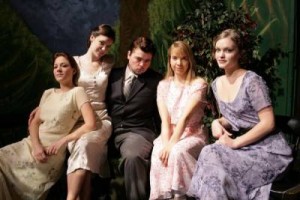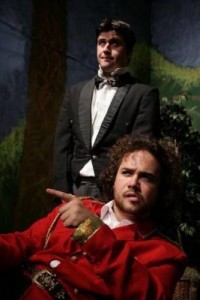
I have a confession. I’m not the worlds biggest Shakespeare fan. Yes, I know that as a theater reviewer it’s my “duty” to love the Bard, so sue me for saying that I often get lost in his convoluted plots, whole chunks of dialog whizzing past me or over my head without really sinking in. Thus, when I tell you that I thoroughly enjoyed (and had very little difficulty following) The Porters of Hellsgate’s production of Love’s Labor’s Lost, this is high praise indeed.
It helps that LLL’s storyline is relatively easy to follow. King Ferdinand of Navarre and three of his noblemen take an oath to “foreswear bodily pleasures” including the company of women (in other words, no hanky-panky) for a period of three years, a vow which they find nearly impossible to keep upon the arrival of the gorgeous Princess Of France and her bootylicious three-lady entourage. Subplots include a Spanish knight enamored of a country milkmaid, love letters delivered to the wrong recipients, and a pair of comic scholars who debate in schoolboy Latin—all loads of fun.
It helps even more that The Porters Of Hellsgate have the ability to make Shakespeare come alive with a skill and grace which belies the youth of the company, many of whom were still in high school just over five years ago. Director/costar Charles Pasternak and producers/castmates Eddie Castuera and Jack Leahy, lived and breathed Shakespeare at Palisades High School and their love and understanding of The Bard are evident in this, The Porters’ eighth production in just two years.
All three prove themselves gifted at making Shakespeare’s dialog come alive, Pasternak as Berowne, the lone naysayer among the King’s trio of noblemen, Castuera as the King himself, and Leahy as Costard, the play’s requisite clown. Like their fellow cast members, the threesome speak in an American English just heightened enough to fit Shakespeare’s Elizabethan idiom without ever sounding affected, and because they understand exactly what they are saying, so does the audience.
The supporting cast is equally fine. Stunning Samantha Singer (the Princess) possesses an elegance of voice and manner perfectly fitting her character, and statuesque Taylor Fisher (Rosaline) has a classic film comedienne quality that serves her well. Matt Calloway (Dumaine), Cody Goulder (Longaville), Alexandra Smith (Katherine), and Angele Dayer (Maria) acquit themselves admirably as the remaining noblemen and noblewomen.
Stealing every scene in which he appears is Gus Krieger as a hilariously (albeit often incomprehensibly) Spanish-accented Don Adriano de Armado, the endearingly foppish suitor of Jaquenetta (curvaceous blonde Maja Miletich playing deliciously clueless). An excellent Dan Sykes (as Don Adriano’s page) and Krieger have great chemistry in their scenes together, and a scantily-clad Sykes later gets laughs for his ingenious muscle-enhancing technique.
Jamey Hecht (Holofernes, a schoolteacher) and Jacques Freydont (Nathaniel, a curate) are a delightfully over-the-top pair of pseudo-intellectuals, and the fact that these actors are several decades older than most of their castmates gives the production an added air of professionalism.
Completing the cast in fine fashion are Thomas Bigley (Boyet, a lord attending the Princess), Dylan Booth Vigus (Dull, a constable), and Bill Quaid (Marcade, a French courtier, and a forester).
Pasternak deserves highest marks for his inspired direction. The Porters’ Artistic Director’s staging is never static. Background actors are consistently involved, either in their own muted conversations or “business,” or listening attentively to whoever is speaking.
Several clever directorial touches revolve around Don Adriano’s letters. When King Ferdinand reads the Spaniard’s first missive aloud, Pasternak alternates the reading of the letter between Ferdinand downstage and Don Adriano upstage (i.e. elsewhere at the time of the letter’s writing) so that we hear both the voice of the reader and that of the writer. In a later scene, where Boyet reads aloud, another of Adriano’s letters, an “elsewhere” Adriano prompts Boyet when the latter is unable to decipher the former’s handwriting. Then, when Boyet has apparently finished the letter, Adriano clears his voice loudly—to signal that there is still more to read.
Despite being staged in a generic black box NoHo theater, the production looks absolutely great. Set designers Charles and Jessica Pasternak have turned the black walls into forest murals and festooned the upstage staircase and surrounding walls with garlands of flowers. The lighting design (by Daniel Keck and director/performer/set co-designer Pasternak, wearing yet another hat) casts the stage in tree-dappled sunlight. Calloway and Max Carlson have come up with an appropriately Elizabethan soundtrack.
Finally, and best of all, are Jessica Pasternak’s absolutely gorgeous 1930s costumes. The four noblewomen wear three different costumes each, a summer dress, riding gear, and an evening gown. It is not only the women’s garb that looks like a million bucks, but their faux-diamond jewelry as well. The men, too, have several costume changes, not one of which looks “low budget.”
Past Porters Of Hellsgate productions have included tragedies (Macbeth, Julius Caesar, Titus Andronicus), a history/tragedy (Richard III) and other comedies (Much Ado About Nothing, Twelfth Night, The Two Gentlemen Of Verona). If their current production is any indication, these gifted Porters’ third season is one to be eagerly anticipated.
Whitmore-Lindley Theatre Center, 11006 Magnolia Blvd., North Hollywood.
www.myspace.com/theportersofhellsgate
–Steven Stanley
December 26, 2008
Photos: Angele Dayer




 Since 2007, Steven Stanley's StageSceneLA.com has spotlighted the best in Southern California theater via reviews, interviews, and its annual StageSceneLA Scenies.
Since 2007, Steven Stanley's StageSceneLA.com has spotlighted the best in Southern California theater via reviews, interviews, and its annual StageSceneLA Scenies.







 COPYRIGHT 2024 STEVEN STANLEY :: DESIGN BY
COPYRIGHT 2024 STEVEN STANLEY :: DESIGN BY